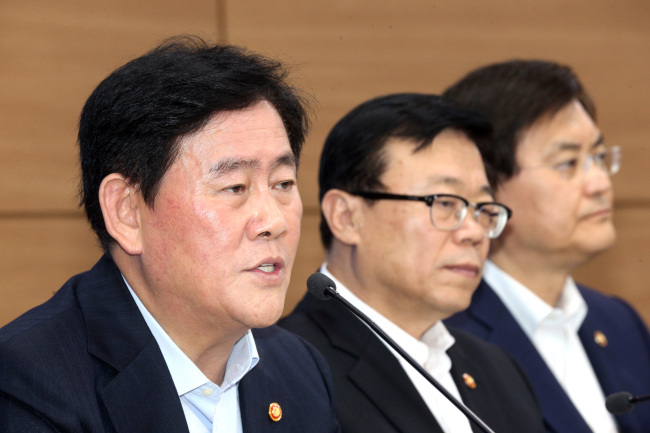Seoul to push tax on corporate cash reserves
Ministry unveils W40.7tr stimulus to boost domestic spending
By Korea HeraldPublished : July 24, 2014 - 21:32
The South Korean government announced a set of economic stimulus measures on Thursday, including a controversial plan to levy taxes on cash reserves kept at the nation’s largest companies.
The finance ministry said, the tax scheme is aimed at reviving domestic demand by funneling excessive corporate cash reserves into the broader economy. The tax rates have yet to be set.
“We will be introducing taxes on cash reserves for the purpose of pushing companies to invest more and to return more to their employees or shareholders, who in turn would have more disposable income,” said Choi Kyung-hwan, the nation’s new finance minister and deputy prime minister.
The finance ministry said, the tax scheme is aimed at reviving domestic demand by funneling excessive corporate cash reserves into the broader economy. The tax rates have yet to be set.
“We will be introducing taxes on cash reserves for the purpose of pushing companies to invest more and to return more to their employees or shareholders, who in turn would have more disposable income,” said Choi Kyung-hwan, the nation’s new finance minister and deputy prime minister.

South Korea logged a trade surplus of $20.2 billion in the first half of the year. The money, however, failed to translate to the broader economy, partly because top profit-earning firms withheld the cash, Choi said.
Companies that use their cash reserves for higher wages and dividends, on the other hand, are to be granted tax incentives.
In other measures, Choi said his ministry plans to inject 40.7 trillion won ($39.5 billion) into the economy until 2015, while easing mortgage rules to help revive the slumping housing market.
The rejuvenation blueprint comes after the country’s economy posted its weakest growth rate in more than a year in the second quarter. This was in the wake of a deadly ferry accident that considerably dampened consumption to the extent that it has offset the modest recovery that Korea’s exports were enjoying.
Citing such adversities, the ministry on Thursday cut its growth outlook for this year to 3.7 percent from 3.9 percent.
“Our economy now stands at a critical crossroads between making a leap forward and falling into a recession,” he said in a news conference after announcing the recovery package.
Despite some market predictions, the minister ruled out the possibility of a supplementary budget this year. Instead, he unveiled a $39 billion stimulus package, including around $11 billion in expanded fiscal spending and $28 billion in extra financing support.
Of the total, some $21 billion will be spent in the second half of this year to spur domestic demand, according to the ministry.
To revive the local housing market ― which Choi sees as vital in jumpstarting the economy ― the ministry announced revised regulations on mortgage loans, including raising the loan-to-value ratio to 70 percent from the current 50 percent for home buyers.
The ministry also decided to raise the debt-to-income ratio to 60 percent. The ceiling on this ratio is currently set at 50 percent for those buying property in Seoul and 60 percent for the surrounding metropolitan area.
Choi, a former floor leader of the ruling Saenuri Party, stressed that the ministry would take expansionary macroeconomic policy in a bold manner until consumer sentiment recovers.
“We’ll do our utmost to stabilize the home market and ensure public welfare,” he said.
By Oh Kyu-wook (596story@heraldcorp.com)
-
Articles by Korea Herald








![[Hello India] Hyundai Motor vows to boost 'clean mobility' in India](http://res.heraldm.com/phpwas/restmb_idxmake.php?idx=644&simg=/content/image/2024/04/25/20240425050672_0.jpg&u=)











